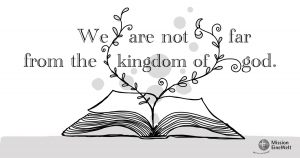Andacht – Reich Gottes
Ich weiß wohl, es ist so: Wie könnte ein Mensch recht behalten gegen Gott. Hat er Lust, mit ihm zu streiten, so kann er ihm auf tausend nicht eines antworten. Hiob 9,2.3
Der Schriftgelehrte sprach zu Jesus: Ja, Meister, du hast recht geredet! Er ist einer, und ist kein anderer außer ihm; und ihn lieben von ganzem Herzen, von ganzem Gemüt und mit aller Kraft, und seinen Nächsten lieben wie sich selbst, das ist mehr als alle Brandopfer und Schlachtopfer. Da Jesus sah, dass er verständig antwortete, sprach er zu ihm: Du bist nicht fern vom Reich Gottes. Markus 12,32-34
Eine der Aussagen Jesu, die meine Aufmerksamkeit immer wieder erregt hat, lautet: „Mein Reich ist nicht von dieser Welt.“ Das war verwirrend für mich und ich stellte es oft in Frage; einige Zeit später half mir jedoch der folgende Satz, zum besseren Verstehen: „In dem Maße, in dem wir uns für ein gerechteres und brüderlicheres Zusammenleben von Mensch und Natur einsetzen, werden wir hier auf Erden Zeichen des Reiches Gottes säen.“ Ah! Sein Reich ist nicht von dieser Welt, aber wir können Dinge tun, die uns dem Reich Gottes näher bringen. Die Lektüre von Hiob erinnert mich an die Erfahrung, die viele von uns machen, wenn wir im Konflikt über die Existenz oder Nicht-Existenz Gottes stehen, und noch mehr, wenn wir mehr und mehr über diesen Gott wissen wollen. Auch in Zeiten von Wohlstand und Normalität. Wir durchleben Verleugnung, Zweifel, versuchen, uns vor ihm zu verstecken, ihm in vielerlei Hinsicht auszuweichen. Ohne die Tatsache außer Acht zu lassen, dass wir sein Handeln sowohl im Privatleben als auch im öffentlichen Bereich beurteilen. In Wirklichkeit haben wir die meiste Zeit das Gefühl, dass Gott nicht handelt, und deshalb ist es schwierig zu erkennen, wie, wann, wo und durch wen er handelt. Tatsächlich sind wir diejenigen, die handeln, und manchmal minimieren wir diese Tatsache. Der Begleittext sagt uns, dass die Schriftgelehrten und die Gesetzeslehrer aus dem Munde Jesu wissen wollen, welches das größte Gebot ist, und nach der Antwort Jesu nennen die Schriftgelehrten ihn: Lehrer, du hast richtig gesprochen. Jesus erinnert uns an die Grundlagen über Gott und das Leben. Jesus bringt das Reich Gottes, die Liebe zu Gott und zum Nächsten, praktisch auf den Punkt. Wenn wir uns an die jüngste Vergangenheit erinnern und all die Handlungen genau betrachten, die die verschiedenen Ausdrucksformen der Liebe zum „Anderen“ widerspiegeln und die für die menschliche Entwicklung und die Sorge für Natur- und Klimagerechtigkeit und andere Aspekte des Lebens entwickelt wurden, werden wir sehen, dass wir nicht weit vom Reich Gottes entfernt sind. Und dass die Erinnerung daran, unsere Pflicht auch in schwierigen Zeiten getan zu haben, danach immer angenehm sein wird, vielleicht nicht für uns, aber für die neuen Generationen.
Andacht: Sergio Rios Carrillo, Referat Entwicklung und Politik, Mission EineWelt
Illustration: Daniela Denk, Öffentlichkeitsarbeit, Mission EineWelt
Una de las expresiones de Jesús que siempre me ha llamado mucho la atención es; “mi reino no es de este mundo”. Era confusa para mí y la cuestionaba mucho; sin embargo, la siguiente frase me ayudó a comprenderla mejor; “en la medida que actuemos a favor de una convivencia más justa y fraterna entre los seres humanos y la naturaleza estaremos sembrando signos del reino de Dios aquí en la tierra”. Su reino no es de este mundo, pero podemos hacer cosas que nos acerquen al reino de Dios. La lectura de Job me recuerda a la experiencia que muchos tenemos cuando entramos en conflicto sobre la existencia o no de Dios, y más fuerte aun cuando queremos saber más y más sobre ese Dios. Pasamos por la negación, la duda, tratamos de ocultarnos de él, le evitamos de muchas formas. Sin dejar a un lado el hecho de juzgar sus procedimientos tanto en la vida privada como en la esfera pública. El poder con el que Dios actúa, es muchas veces incomprensible para nosotros. En realidad, la mayoría de las veces sentimos que no actúa y por lo tanto es difícil identificar cómo, cuándo, dónde y a través de quienes actúa. La lectura del texto de acompañamiento narra que los escribas y los maestros de la ley quieren saber de la boca de Jesús cuál es el mayor mandamiento y después de la respuesta de Jesús, los escribas le llaman, maestro has hablado correctamente. Jesús nos recuerda lo básico sobre Dios y la vida. Jesús hace prácticamente un resumen del reino de Dios, amar a Dios y amar al prójimo. Si recordamos al reciente pasado y observamos con atención todas las acciones que reflejan las diferentes expresiones de amor hacia el “otro” y que se han desarrollado en pro del desarrollo humano y el cuido de la naturaleza y la justicia climática y otros aspectos de la vida, veremos que no estamos lejos del reino de Dios. Y que el recuerdo de haber cumplido con nuestro deber aun en tiempos difíciles siempre será grato después, quizá no para nosotros, sino para las generaciones venideras.
Sergio Rios Carrillo
Dabiela Denk
How can a man be in the right before God? If one wished to dispute with him, he could not answer him once in a thousand times. Job 9:2,3
The scribe said to Jesus, “You are right, Teacher; you have truly said that ‘he is one, and besides him there is no other’; and ‘to love him with all the heart, and with all the understanding, and with all the strength,’ and ‘to love one’s neighbor as oneself,’—this is much more important than all whole burnt offerings and sacrifices.” When Jesus saw that he answered wisely, he said to him, “You are not far from the kingdom of God.” Mark 12:32-34
One of the expressions of Jesus, which always caught my attention, is: „My kingdom is not of this world“. It was confusing for me and I often questioned it; but some time later, the following sentence helped me to understand it better: „To the extent that we work for a more just and fraternal coexistence of man and nature, we will sow signs of the Kingdom of God here on earth“. Ah! His kingdom is not of this world, but we can do things that bring us closer to the kingdom of God. Reading Job reminds me of the experience many of us have when we are in conflict over the existence or non-existence of God, and even more so when we want to know more and more about this God. Even in times of prosperity and normality. We live through denial, doubt, trying to hide from him, avoiding him in many ways. Without ignoring the fact that we judge his procedures both in private and public life. In reality, most of the time we have the feeling that God does not act, and therefore it is difficult to know how, when, where and by whom he acts. In fact, we are the ones who act, and sometimes we minimize this fact. The reading of the accompanying text tells us that the scribes and teachers of the law want to know from the mouth of Jesus, which is the greatest commandment, and after Jesus‘ answer, the scribes call him: „Teacher, you have spoken correctly. Jesus reminds us of the basics about God and life. Jesus brings the Kingdom of God, the love of God and neighbour, practically to the point. If we remember the recent past and look closely at all the actions that reflect the different expressions of love for „the other“, which were developed for human development and care for natural and climatic justice and other aspects of life, we will see that we are not far from the Kingdom of God. And that the memory of having done our duty even in difficult times will always be pleasant afterwards, perhaps not for us, but for the new generations.
Prayer: Sergio Rios Carrillo
Illustration: Daniela Denk




 Illustration: Daniela Denk
Illustration: Daniela Denk